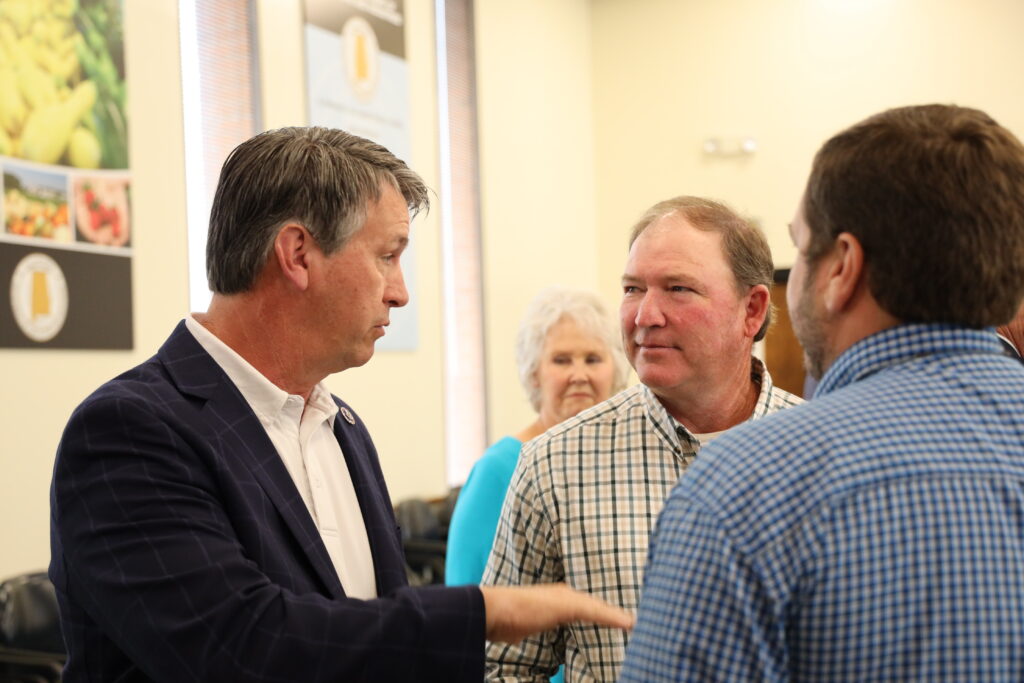Farm Bill Talks Heat Up as September Deadline Nears

By Marlee Jackson
A spring filled with listening sessions, farm visits and stakeholder meetings has set the stage for D.C. decision-makers to build a bipartisan farm bill that better serves farmers.
But the tall task has a tight timeline and even tighter party lines, said the Alabama Farmers Federation’s Mitt Walker. Current farm bill legislation, passed in 2018, expires Sept. 30.
“Following quite a few hearings and listening sessions across the country and in D.C., Senate and House ag committees are hard at work to meet a tight deadline,” said Walker, who manages national affairs for the state’s largest farm organization. “Not only is the timeline tight, funding could be tight as well, but we are pushing hard for an increase of resources to strengthen farmers’ safety net with a focus on raising reference prices.”
The 118th Congress includes 49 Republicans, 48 Democrats and three independents in the Senate. All three independents caucus with Democrats, giving the party a two-vote majority.
Meanwhile, the House has 222 Republicans and 212 Democrats, with one seat vacant. Farm bills are reauthorized every five years, which means more than half the House has never voted on the comprehensive food and nutrition legislation.
“There will be a narrow window for crafting and passing a bill that is fiscally responsible, while also providing a meaningful level of support for farmers,” Walker said. “That said, Alabama has strong leadership on the Senate and House ag committees in Sen. Tommy Tuberville and Rep. Barry Moore. They’re ready to tackle tough topics on Capitol Hill, and we’re grateful for their leadership and support.”

Tuberville and Moore were both backed by Alabama FarmPAC in recent elections and have built close relationships with farmers, Walker said.
Federation members visited their Washington, D.C., offices this spring during the Washington Legislative Conference. Those and other honest conversations are paying dividends as Tuberville and Moore fight to preserve and expand programs that benefit farmers and rural Alabama, Walker said.
Tuberville’s 2023 Farm Bill priorities include protecting crop insurance and farm safety nets; increasing reference prices; addressing rising input costs; extending and expanding feral swine eradication programs; supporting broadband investments; prioritizing working lands conservation programs; and ensuring all conservation programs remain voluntary, market-driven and incentive-based.
“Agriculture is a vital part of our state’s economy, and it only makes sense that we have a seat at the table for important negotiations like the farm bill,” Tuberville said. “Our country not only relies on the current generation of farmers, but we’re depending on the next generation to carry the torch and keep not only the United States, but the world, food secure. That’s why we need to cut burdensome red tape that inhibits production so family farms remain intact for generations to come.”

Like Tuberville, Moore and his staff held listening sessions this spring to fine-tune farm bill priorities.
Key areas include supporting strong safety nets through farm programs and crop insurance while backing young, beginning and veteran farmers with technical assistance and credit access. Alabama-centric policies are front and center, too, such as supporting forestry stakeholders, eliminating non-tariff trade barriers and exploring opportunities to expand work on feral swine eradication.
“The inflated farm economy we find ourselves in is not sustainable for our producers without help from the House and Senate agriculture committees and the farm bill,” said Moore, who was raised on a farm in Coffee County. “This legislation is incredibly important to the people in Alabama’s Second Congressional District, Alabama, the U.S and international partners, too. And whether people realize it or not, it impacts their daily lives.”
